I’m sharing a study psychologist’s ultimate guide to developing a truly phenomenal study routine. Unfortunately, there’s no perfect one-size-fits-all study routine. But, by learning how to interleave study sessions, breaks and rest, you’ll easily maximise your time, energy and attention effectively.
By William Wadsworth, the Cambridge University trained cognitive psychologist and specialist in how to study smarter, not harder. He leads the world’s largest research study on use of effective learning strategies, is regular exam prep expert for The Times, and hosts the Exam Study Expert podcast, with 1 million downloads to date.
Additional research, graphics and article review by Dr Kerri-Anne Edinburgh
Our mission is to provide high quality, reliable content that helps learners reach their academic goals by developing sustainable, healthy study habits. To ensure our articles meet that high standard, we always follow a rigorous editorial process: starting from ideation and research, right through to final reviews and corrections. Please visit our Editorial Policy if you would like to learn more.
Prefer to listen? This article is also available as a podcast episode:
- Prepare to PUT AN END to procrastination:
- Study routine FAQS: how to build a perfect study routine
- An example of a good study timetable (psst: it's mine!)
- The importance of taking breaks while studying
- 3 tips for maintaining your energy during your study routine
- 3 time-saving life hacks for building your study routine
- 5 important lessons you can learn from my mistakes
- Recap: the top 10 tips for creating the BEST possible daily routine for students
- The Science Of Studying Smart
Prepare to PUT AN END to procrastination:
… to STOP wasting time with an unfocused, unplanned study timetable… and to BANISH those pangs of guilt at not getting enough studying done today. (Again.)
It’s time to get to work.
To bring the whole thing to life, I’m going to break down the exact study routine that I used to graduate in the top 10% of my class on a competitive course at Cambridge University.
I’ll share every single one of the secret strategies and time-hacks I used.
But more than that: I’ll even put my “exam success coach” hat on, and tell you what I should have done better with the benefit of hindsight – so you can avoid making the mistakes I did.
Before I walk you through my daily timetable, lets first understand what makes for the perfect study routine / timetable by answering some questions I’m frequently asked:
Study routine FAQS: how to build a perfect study routine
I’ve seen hundreds of daily study routine examples for students in my years as an exam success coach. Some were good. Some were disastrous. Virtually all had significant room for improvement.
Let’s dissect the good and the better:
1. What do the best daily routines for students achieve?
The best daily routine for students should be maximising three things:
- Study time: the hours you carve out to study
- Energy: the fuel in the tank – so no falling asleep at your desk
- Attention: keeping you focused, mind on the job, not distracted
Productivity expert Chris Bailey – who I spoke to for the Exam Study Expert podcast – sees time, energy and attention as an inter-related system.
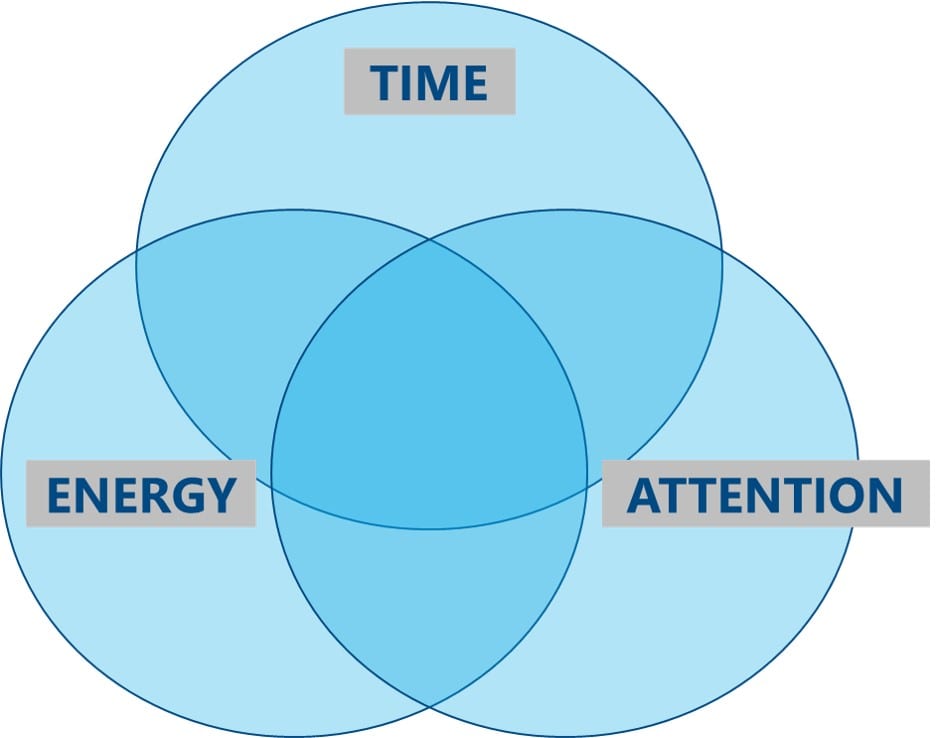
Without time, you clearly can’t get any work done.
But sometimes, you need to invest time in order to gain more energy (e.g. by sleeping or exercising) or boost attention (e.g. by meditating).
The higher your energy levels, the more intently you can focus, boosting your attention, and helping you get more work in less time.
It all fits together: you need to get all three parts right for the best daily study routine.
2. How many hours a day can you effectively study for?
Many students don’t appreciate this, but it’s actually more important to concentrate on increasing the quality of your work before you worry about the quantity. Familiarise yourself with modern, highly-effective study strategies like spaced retrieval practice, and be sure to create conditions for intense focus wherever possible. (See my learning science cheat-sheet for details.)
Basically: there’s no one-size-fits-all study timetable.
I was doing about 8-9 solid hours’ work per day in the 6-8 weeks leading up to my final exams at Cambridge. This represents an upper limit based on my 10-years’ experience as a study coach, as well as the available productivity studies.
You can go above this limit for a short time, but try to sustain the habit too long, and your productivity-per-hour will drop dramatically. Work long hours for too many days, and you’ll reach the point where your tired and working slowly, so doing the same (or less!) quality work as if you were working shorter hours.
I wouldn’t even suggest taking 8-9 hours as a target. That’s a pretty high work rate and won’t necessarily be right for you, especially if you’re pre-University (e.g. high school) or on a less demanding course.
And if you’re fitting in your exam study around a schedule of classes, you won’t be able to get anywhere near that.
So you might be aiming for a study timetable of 6 hours a day, or 3 hours, or maybe just 1 or 2 hours, depending on your circumstances. Find a balanced routine that suits you.
3. Where is the best place to study?
Before I show you the timetable I was using, there’s one other bit of context I want to give: where I worked.
This space underpinned the success of my entire study routine. I honestly believe that without a great environment to work in, the whole thing would have fallen apart in my case.
So what was this magic room?
At Christ’s College Cambridge, there’s a room called the Plumb Auditorium. Picture a room with 50 students working at individual desks, in total silence. Some of my friends hated it there because it felt so intimidating, but I loved it.
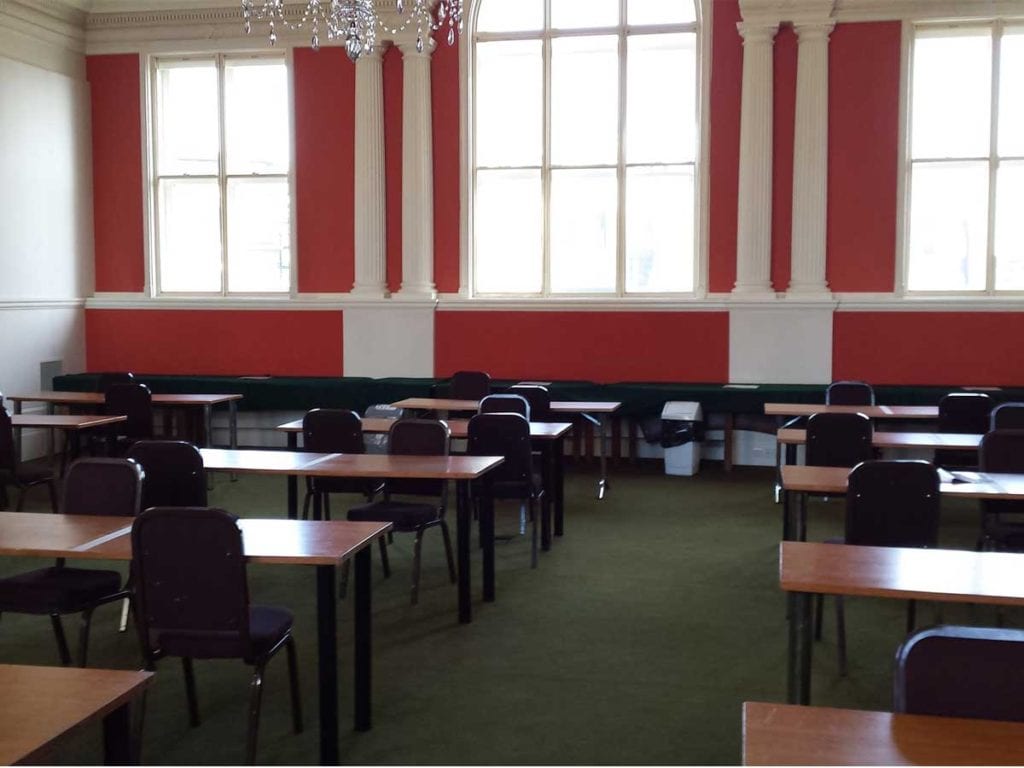
I probably owe my degree to the Plumb, more than any other single factor, because it helped me do two crucial things:
- Firstly, maximise my time: there was SUCH a strong social pressure to work in that room – because everyone there is working – it’s relatively easy just to get your head down and study in order to fit in.
- Secondly, maximise my attention: there are no distractions in the Plumb, other than someone getting up to change the climate control settings from time to time. Pure focus.
There were probably even benefits beyond productivity. There’s a cool effect in psychology called “context-dependent recall” which essentially means that if you learn information in an environment that’s similar to the environment you’ll be in when you have to recall information, it will be easier to remember what you learned!
Takeaway: if your study room feels like your exam hall, your memory is likely to work better on exam day. Neat.
Although if you’re going to get stressed out in a place like this, you might need to find somewhere less intimidating. Your bedroom / dorm room, perhaps, or even a coffee shop. Just make sure that the environment you choose is supporting your desire to study, not distracting you from it.
An example of a good study timetable (psst: it’s mine!)
The full daily routine schedule I was using during exam term looked something like the following:
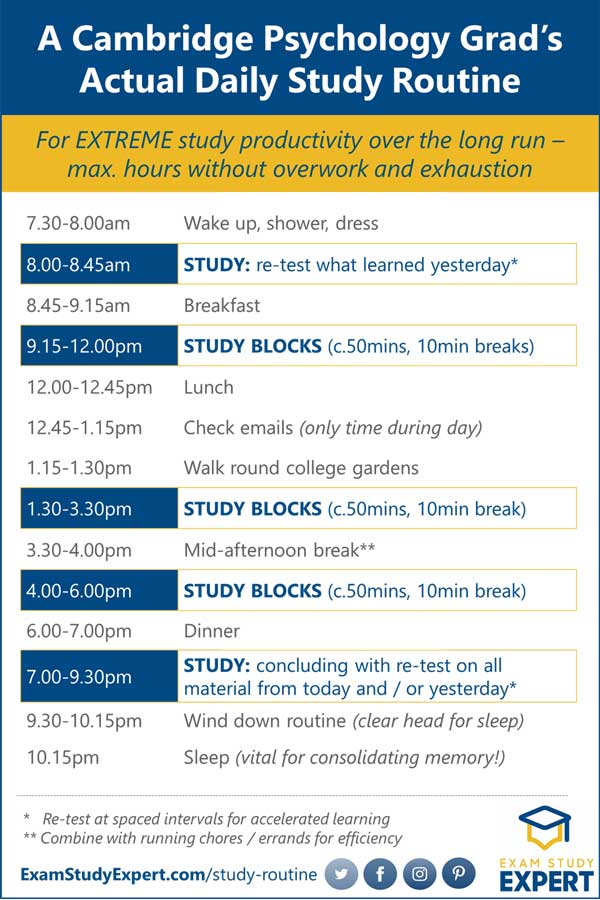
It was pretty intense! Every day I would follow this study timetable:
- 7.30-8.00am: Wake, shower, dress
- 8.00-8.45am: Recap material I learned yesterday
- 8.45-9.15am: Breakfast
- 9.15-12.00pm: Studying new stuff (typically 50-55min blocks, with 5-10 min breaks)
- 12.00-12.45pm: Lunch
- 12.45-1.15pm: Check and respond to emails
- 1.15-1.30pm: Walk round college gardens
- 1.30-6.00pm: Studying new stuff (again, with 5-10 min breaks every hour, and usually including one longer break mid-afternoon of c. 30mins)
- 6.00-7.00pm: Dinner
- 7.00-9.30pm: Studying (concluding with recap of material covered that day)
- 9.30pm: Wind down routine, clearing head before sleep
- 10.15: Sleep
At first glance, this is a pretty strong daily routine example for any student to follow…
… BUT…
A word of caution on making a good study timetable for YOU
Please don’t see this the perfect study routine / timetable template for you: your circumstances are almost certainly different to mine.
And circumstances don’t stay fixed. The routine you need when you’re studying for major exams might be different from what you need for the rest of the year.
So you’ll need to customise the routine to YOUR needs. That’s why I’ve gone to such lengths in this article to explain the principles behind the timetable. When you know WHY I did (or didn’t) do certain things, you can make great choices for yourself.
And again, don’t see this study schedule as a target, and beat yourself up if you fall short. It’s a tough routine to keep.
For me, I could only keep this up for a few weeks leading up to my final exams each year, when I was a relatively mature and experienced scholar, in my early twenties. If you’re younger, I’d aim for far less work each day.
How to get into the perfect routine as a student
Thinking of starting a routine like this?
I’ll be honest, getting settled into this routine took a few days of quite intense willpower.
But the good news is that it quickly becomes automatic.
By the second week, I’d got it bedded in and it was feeling like a habit. My body knew that when it woke up in the morning, this was how I’d be spending my day. It would have almost felt weird to do anything else, like not brushing your teeth in the morning.
Stick with your new study schedule for the first week – and things will get easier after that, I promise.
And if you’re finding the routine impossible to keep, check you haven’t tried to take on more than you can manage. Try dialling your ambitions way back. Start small, maybe just an hour, maybe even just 15 minutes each day. Whatever it takes to get comfortable, and build a daily habit. You can start to ramp up from there.
The importance of taking breaks while studying
If you’re planning to study hard, you will absolutely need space in your life to rest and recharge.
Breaks are vital for making sure energy levels stay high for weeks on end, avoiding burnout.
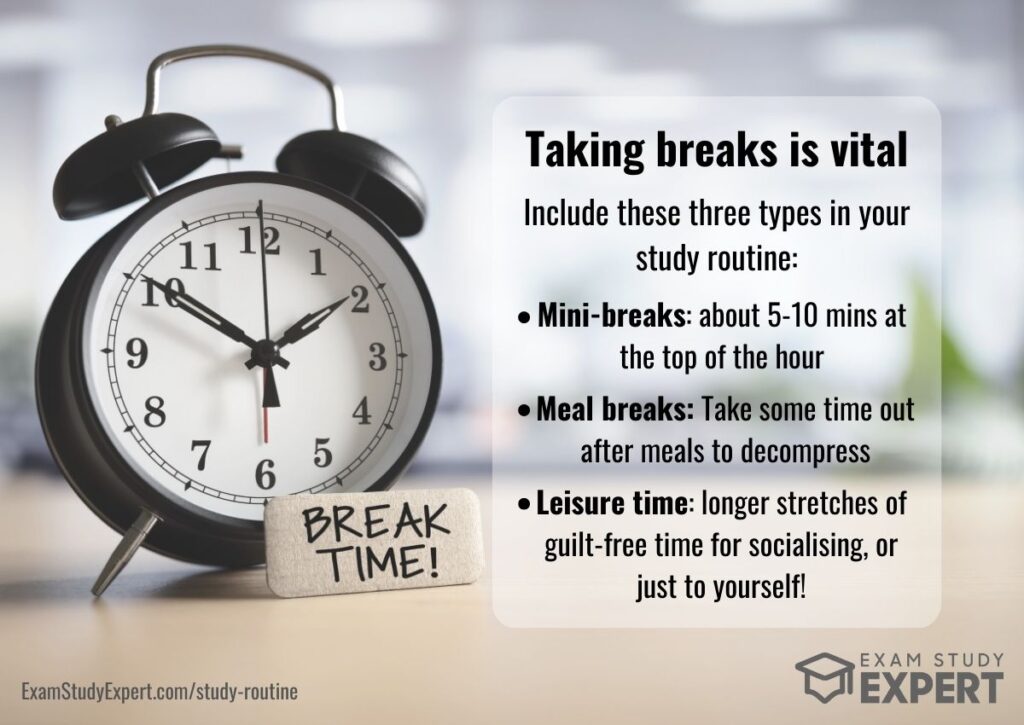
I took my down-time in three scheduled places as part of my study timetable:
- Mini-breaks: about 5-10 mins at the top of the hour.
- A quick break to get water, walk around, exchange a couple of words with a friend in the break-out room. I watched other students stay at their desk for 2-3 hours or more at a stretch – no way was their concentration level good for much by the third hour.
- Around meals: I always took some time out after meals to decompress before getting back to work.
- E.g. a walk around the college gardens after lunch. (Wow, doesn’t that sound fancy? Wait till you hear they called it the “Fellows’ Garden”…).
- Leisure time: longer stretches of guilt-free time for socialising, or just to myself.
- I had a few times each week which were sacred chillout / social times. I’d been working hard all week, so these were precious hours to recharge and refresh, 100% guilt-free.
It may seem like the time away from your books is time badly spent.
But study breaks will increase your productivity overall, because you’re topping up your energy levels again, allowing you to get back to work with renewed focus.
If you never rest, you’ll drain your batteries, and end up in a downward spiral. You’ll get tired, work unproductively, sink long hours to try to catch up, only to get even more tired, slower and still further behind.
Besides, time off is a great incentive to keep you on-task when it is time to study. I found myself really looking forward to the Saturday evenings I carved out as guilt-free social time. It kept me working hard leading up to the down-time in order to feel like I’d really that time off.
3 tips for maintaining your energy during your study routine
Breaks were a big part of keeping energy levels up, but there were three other significant pieces of the puzzle:
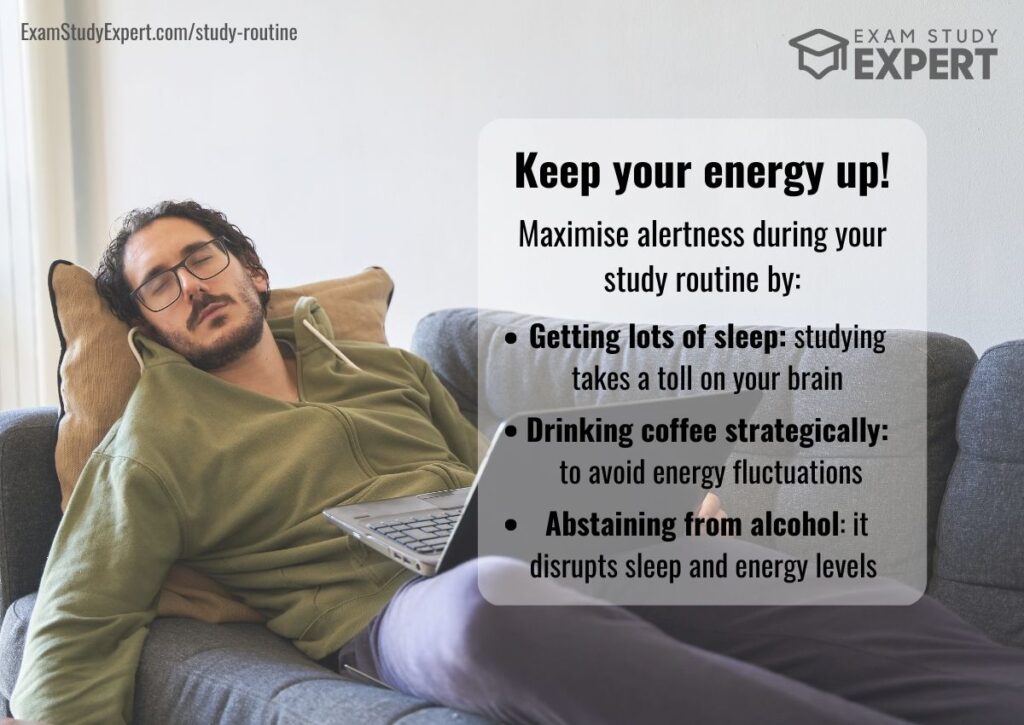
1. I slept more than I ever have before or since
Studying takes its toll on your brain.
Sleep is not only important for keeping your energy and attention levels up the next day, it’s also vital for consolidating memory. I was getting about 9 hours a night, and never had any problems feeling sleepy during the day as a result.
Note that you can’t study right up to bedtime! You need to stop and give yourself some time to wind down.
For me, that was at least 45 minutes. You might want to take an hour. I certainly wouldn’t do much less than half an hour. Leave longer the night before the exam, because you’ll often need longer to calm down before sleep – a full two hours if you can.
2. I drank caffeine only strategically
Caffeine can absolutely give you an energy boost, but you pay for it later (I’ve explored the science behind caffiene and studying thoroughly, so trust me!).
It’s really just postponing sleepiness, causing spikes and troughs in your energy levels. During my study routine I switched to decaf, for the most part, to avoid fluctuations in alertness.
Having caffeine in your system also contributes to that state-dependent recall effect I was talking about earlier. I was planning to be caffeine-free when I took exams and trying to recall the information, so I wanted to be in the same physiological state when I was learning the information in the first place.
3. I abstained
I was 20 at the time, which is old enough to legally drink alcohol in the UK. But I gave it up entirely for the 6-8 week period. Alcohol robs you of energy the next day, in part by disrupting sleep, so this was another way to stabilise energy levels.
But I think more than that, it fed my temporary identity that everything in my life during those weeks was 100% focused on one thing: studying for those exams.
It’s a bit like how monks give up worldly pleasures so they can be more focused on their spirituality.
If you like, I became a study-monk! And the alcohol abstinence helped reinforce that temporary self-image.
3 time-saving life hacks for building your study routine
Of course, life can’t just be a mix of studying and breaks.
You’ve got to eat, shop, do laundry, check emails… All that stuff that can’t be put on hold for too long without life falling apart quickly.
(For me, eating especially… if I missed a meal I was useless.)
But while you can’t avoid these tasks, you can be clever about minimising the amount of time all that stuff takes.
So here are three time-saving hacks to consider when scheduling your study routine:
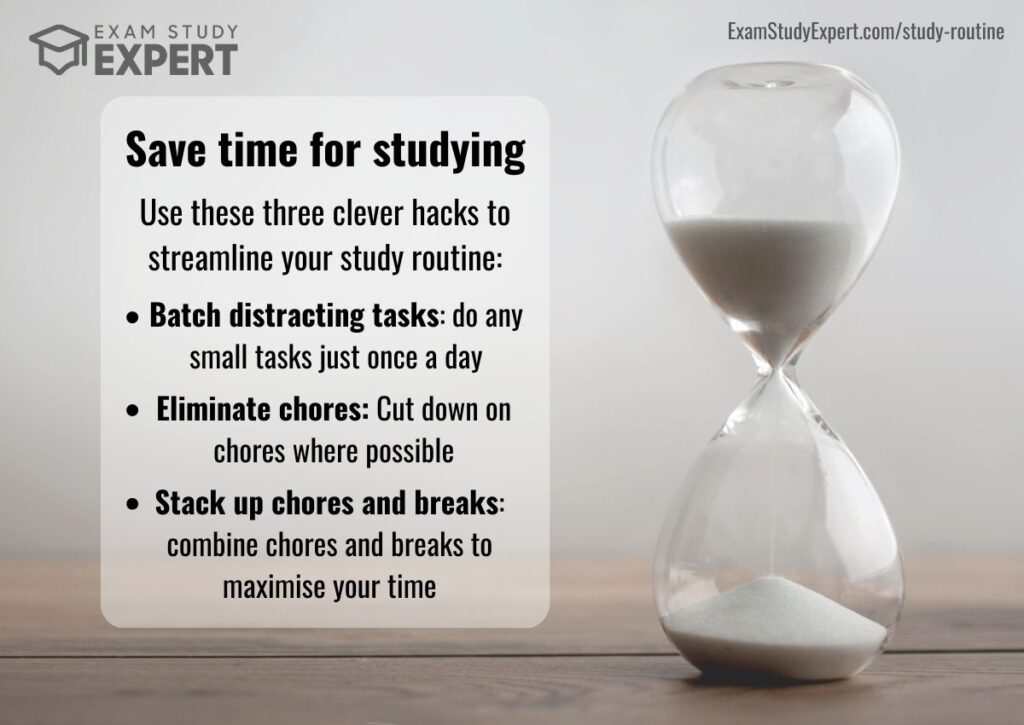
1. Batch distracting tasks
I checked and responded to emails and messages once per day: usually just after lunch.
“Batching” like this helped get through them quicker. But even more than that, it also helps maximise attention through the day. Essentially, I’m not constantly distracting my the thoughts of what people might be messaging me about.
So you can save time by doing more at once, and doing the task less frequently, as I did with emails. Laundry is another great chore to apply the “batching” principle to.
2. Eliminate all those pesky chores (where possible!)
I eliminated chores where I could: I ate in the college canteen 3 times a day for the most part when in top study-gear mode.
I couldn’t afford to do this all year round, but for a few weeks, it was OK. So no cooking, no washing-up, and less grocery shopping. And let’s be honest, having a meal with friends is a great time to get some much-needed social contact.
3. Stack up your breaks and chores
I “stacked” other chores by combining with study breaks: rather than see chores as interrupting work, I made them into study breaks.
I needed to take a break in the afternoon anyway, why not use it to pop out to get more pens or flashcards? It was a nice and fairly short walk into town, so made a great break.
There are plenty of other tasks you can apply stacking to: e.g. listen to a podcast while doing your laundry or going shopping.
5 important lessons you can learn from my mistakes
Well, so far this is all sounding pretty good.
A solid set of strategies, many of which I still recommend to my coaching clients to this day when I’m helping them craft the perfect study routine for them.
But so much for patting myself on the back. We’re into the home straight now, so it’s high time I talked you through what I wasn’t doing so well.
In the introduction, I said that no matter how good a study routine is, there’s ALWAYS room for improvement.
Well, I’m no exception to this. So with the benefit of all I’ve learned about effective ways to study since my university days, here are the five main things I’d do differently if I was planning a study schedule now:
1. I’d meditate to boost focus
Since I was at University, there’s been an absolute pile of scientific evidence on the benefits of meditation: boosting focus and concentration, lowering stress and anxiety, supporting good mental health, and even helping your memory.
And these days, meditation or mindfulness practice is mainstream. It’s not weird, or specific to any religion. It’s just a really nice, easy practice you can do by yourself in just a few minutes a day.
Top tip: If you’re not sure how to get started with meditation, then I wholeheartedly recommend Headspace. It’s a great tool for students (and teachers!), packed full of dedicated content to help you focus, boost your concentration and get better sleep. Learn all about the Headspace app in my thorough, honest review!
2. I’d turn my phone off when I was working
I was pretty good at not checking it, but really, I should have had my phone turned off.
No excuses really, given the havoc smartphones can wreak on our concentration levels. It was pretty much the one source of external distraction I had left once I moved to the sanctity of the Plumb Auditorium, and it was so easy to eliminate.
Minimising distraction and eliminating multitasking is key to getting into “Deep Work” mode and maximising focus and productivity.
3. I’d maintain a “distractions” journal
Even once you’ve eliminated all those external distractions, the mind can be a constant source of internal distraction.
Worrying about calling your grandparents back. Thinking about chores you need to do, or supplies you need to buy. Planning what you’ll do for dinner with friends on Saturday. Remembering to pick up your mail tonight. Daydreaming about your travel plans over the summer vacation.
If you leave all those thoughts in your mind, they’ll suck up valuable mental bandwidth.
So I now advise students to keep a “distractions list” to hand while working, to make a note of all that random stuff as it pops into mind. Some of it might form a to-do list you can get through on your next long break. Some of it might not need any action at all, but by writing it down, you help to clear your mind, and leave it free to focus on the task at hand.
4. I would cut down on sugar
Since I wasn’t drinking coffee, I’d often turn to sugary snacks to get a fast boost when I needed one. But as with caffeine, the temporary boost often quickly gives way to an energy crash. I’ve been hearing about the massive benefits of reducing your sugar intake for years – trim figure, more energy, fewer health problems later in life…
My own sugar intake these days is way down on what it was some years back, and my experience is in line with all the research on sugar, I’m feeling good and find I have much more energy than I used to.
5. I’d get some exercise
It’s been said that exercise is:
“The single most powerful tool you have to optimise your brain function”
John Ratey, Spark: The Revolutionary New Science of Exercise
I’d never been much of an athlete, and so I figured that taking time out of the day to go for a run was time better spent studying.
But again, I’d do things differently now. I’ve become much more consistent with exercise, and I find the extra productive time I get as a result of exercise more than outweighs the time needed to get a 20-minute jog in.
Richard Branson famously drew a similar observation: he reckons his morning hour of exercise adds around four hours of productivity to his day.
Recap: the top 10 tips for creating the BEST possible daily routine for students
We’ve covered a LOT of good ideas for your study schedule in here.
Let me end by summarising my top 10 tips for creating an INCREDIBLE daily study routine.
(BTW, if you have been skimming and haven’t read the detail in this article, you’ve been missing out! Some of these summary points won’t make much sense… Go back up and invest a couple of minutes to read more carefully, and I promise you’ll earn the time back HUNDREDS of times over through the power of your new study routine.)
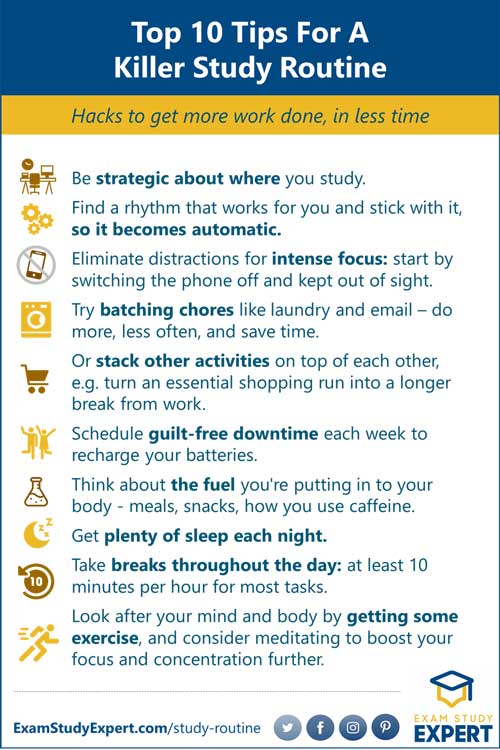
- Be strategic about where you study – your environment
- Find a rhythm that works for you and stick with it, so it becomes automatic
- Intense focus (no distractions), including turning off your phone
- Batch your chores like laundry and checking your email
- Stack other activities on top of each other, like getting some much-needed social contact over lunch, or using a necessary shopping run as a longer break from work
- Schedule guilt-free downtime each week to recharge your batteries
- Think about the fuel you’re putting into your body – the meals you eat, the snacks you choose, how you use caffeine
- Get plenty of sleep each night
- Take breaks through the day
- Look after your mind and body by getting some exercise, and consider meditating to boost your focus and concentration further
Wrapping up with three next steps:
- We’d love to hear from you: have you created your own pro study routine? Which tricks did you find tipped the scales from mediocre to wildly effective? Let us know in the comments section below!
- There are plenty more easy tricks and strategies you can use to streamline your study routine: pick your favourites from my 37 essential strategies for studying effectively and you’ll soon be remembering even more in less time!
- Remember that WHAT you do (i.e. HOW you spend your time when you are studying) is even more important than creating a killer routine. You can get smart about your study strategies right now with my handy, science-backed cheat sheet. Click here to download your copy today, and make sure you get the highest grades possible.
See you at the top of the class!

By William Wadsworth, the Cambridge University trained cognitive psychologist and specialist in how to study smarter, not harder. He leads the world’s largest research study on use of effective learning strategies, is regular exam prep expert for The Times, and hosts the Exam Study Expert podcast, which has 1 million downloads to date.
Author Profile | About Us | Editorial Policy | Contact Us



thank you for these such good advices.
Wait, you studied by 7:00am to 8:00am
What about class
Ah – no, this was just in the final few weeks before exams. Not year-round. As I tried to emphasise at various points, it’s not a template, more to illustrate the principles that go into designing the right routine for you 🙂
Wishing you every success with your studies!
Comment *excessively helpful to me
Fyi itse Liyana and i am in secondary 1 sol mxt yr 7th grade
Details are in this post is excellent and very interesting and I would like to share this post with my all friends.
So glad you enjoyed it – good luck with the studies!
Other sites: focus on time-table(100%)
Here: strategies + reason behind time-table + a lot of stuff
So blessed to waste my time reading this article, god bless u🙂🧡🙏
I remember getting “how to revise for exams” lessons when I was at school that were basically “here’s how to draw a timetable out” – and it was totally useless every time, I followed it for about a week at best then stopped!
I find the strategies I’ve written about here get much better results – not just for me, but also for the students I coach 🙂
I love, love, love this article. Realistic advice is just what premeds need. I’m looking at Ty’s questions and thinking: there is so much ground to cover, even in high school! Mental preparation requires finding resources and people/communities who can support these students in their challenging endeavors.
I’m glad you found it helpful! I hope it can help pre-med and other kinds of students make the most of their valuable time each day 🙂
Studying early in the morning may work best when the brain is better able to focus. After 8 hours of sleep, the mind of an individual feels fresh and works better.
Yes, definitely! A good night’s sleep is vital 🙂
Studying in the morning works great for lots of students too – I’m certainly in the camp of getting my best work done before 2pm.
Good Info…….
I think its helpful .So thanks for the help.God may bless you.keep up ,starting the name of Almighty one
I am reading this article from Iran For the medical exam, about 0.5% of the participants are accepted.
Thanks for your article and good information.
Good luck to everyone everywhere.
Informative article
I was searching for this information on google